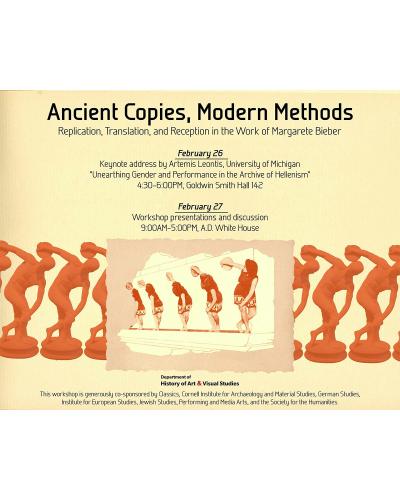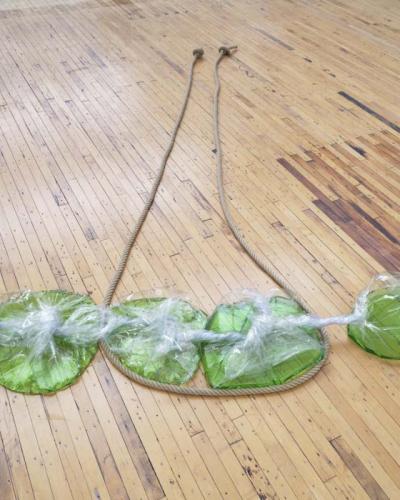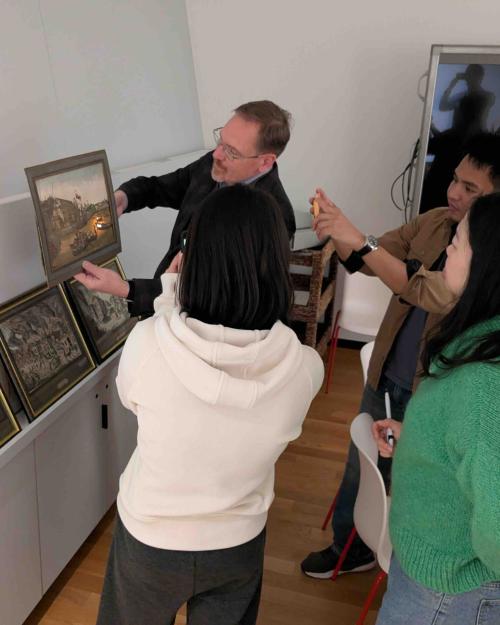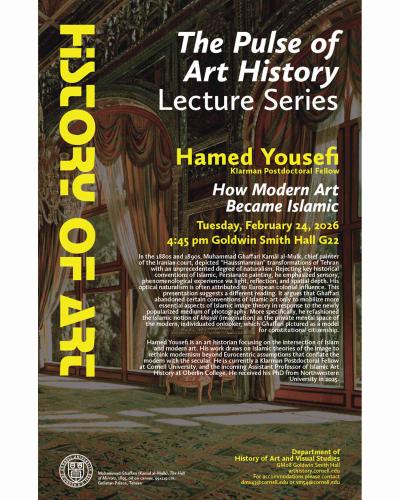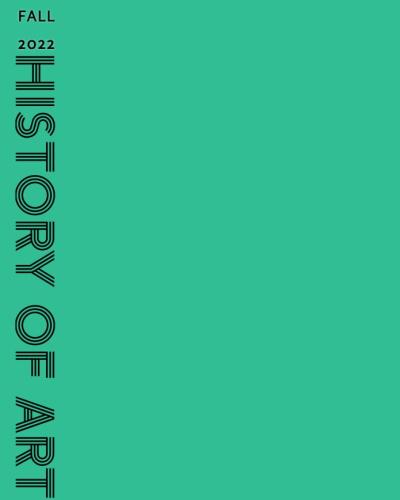Fall 2022
ARTH 1100 Art Histories: An introduction (SHUM 1100)
T/R 2:45 - 4
B. Anderson
Discussions: 201: F 10:10-11am 202: F 11:20-12:10 203: M10:10-11 204: M 11:20-12:10
This lecture course introduces students to the History of Art as a global and interdisciplinary field. Team-taught by professors from the department, in collaboration with members of the staff and faculty of the Herbert Johnson Museum of Art, its primary aim is to familiarize students with the most significant geographical areas, epochs and works of art, as well as with methods employed in their study and analysis. The course will be organized around a changing selection of themes central to the history of art. The theme for fall 2022 is "Ornament." In addition to painting, sculpture, and architecture, we will consider a range of objects of material culture, from ceramics to metalwork to the human body itself. We will consider intersections of aesthetics and utility, and the attitudes of various cultures, from antiquity to the present, toward adornment and its interpretation.
ARTH 1173 FWS: Portraiture
TR 8:05 – 9:20
B. Anderson
How does one capture the likeness of an individual? What purposes do portraits serve, and by which criteria may they be judged? Are there aspects of a person that elude representation? We will pose these questions of both artistic and literary portraits, and seek answers by writing about portraits here at Cornell: in our museums, libraries, and around campus.
ARTH 1174 FWS: Photographs and Text TR 1-2:15
K. Pavlenko
Like the right Instagram filter, writing can change the way a photograph impacts its viewer. This course touches on some of photography’s key histories and concerns to improve the way students write with images. By making something appear, a photograph wields great power on a screen or printed page. Writers not only elegantly describe photographs, but mine, subvert, and silence images with text. Class sessions will cover topics related to conceptual art, the documentary tradition, fourth-wave feminism, and postcolonial theory to interrogate photography’s possibilities against the writer’s responsibilities.
ARTH 2200 Introduction to Art History: The Classical World in 24 Objects (ARKEO 2700, CLASS 2700)
A. Alexandridis
M/W 2:45-4:00 Discussions: 201: F 9:05-9:55 202: F 10:10-11:00
Why are the most famous ancient Greek vases found in Italy? What was the "worlds' first computer" used for? What can a brick tell us about still standing Roman buildings? What is “classical” about all this and why should we care? This course on the art and archaeology of ancient Greece and Rome will address all these questions. Covering the time span from the Bronze Age (3rd millennium BCE) to the time of Constantine the Great (4th century CE), the class will focus on one object or monument per lecture and how it can be considered exemplary for its time. Students learn about and practice different ways of how to look at and analyze material evidence.
ARTH 3565/ 6563 Art and Architecture of Colonial Latin America (LATA 3565/ VISST 3565)
A. Cohen-Aponte
TR 9:40 – 10:55
This course surveys the artistic and architectural traditions of Latin America during the period of Spanish colonial rule (ca. 1520s-1820s). It will center primarily on visual cultures of the viceroyalties of New Spain (Mexico) and Peru, but will also cover works of art and architecture from the Caribbean and the northern Andes. The course explores the legacy of pre-Columbian visual traditions in the colonial era as well as the lasting impact of colonial artistic practices in modern and contemporary Latin America. It will also examine colonial Latin America as the crossroads of dynamic artistic and cultural interaction between Indigenous, European, and Afrodescendant groups. Topics to be explored include issues of visual translation and transmission, art and agency, and the creation of new colonial artistic practices and idioms.
ARTH 3650/6653 History & Theory of Digital Art (INFO 3660/STS 3650/VISST 3650)
M. Fernandez
MW 2:45-4
In this course, we will examine the role of electronic and digital technologies in the arts of the late 20th and 21st centuries with emphasis on Europe and North America. Beginning with the cybernetically and systems-inspired work of the late sixties, we will explore early uses of computer technology, including early experiments in synthetic video in the 1970s. An overview of pre-internet telematic experiments will lead to an investigation of net art and later currents of digital art. The ongoing development of behavioral art forms will be a central theme. Critical evaluation of various attitudes concerning technology will be encouraged.
ARTH 3850/6850 The Arts of Southeast Asia (ASIAN 3350, MEDVL 3850/ 6850, VISST 3696)
K. McGowan
MW 9:40 – 10:55
The arts of Southeast Asia are studied in their social context, since in traditional societies creative processes are often mapped on the sequence of events that compose human lives. We will be looking particularly at the gendered ways in which bodies are mapped on the land, and how these various framings are often reflected in the unique relationships that emerge between works of art and textual sources. The South Asian epics of the Ramayana (Story of Rama) and the Mahabharata will be explored during the semester as infinitely renewable sources of inspiration.
ARTH 4101/6101 Proseminar: Introduction to Methods (VISST 4101)
A. Alexandridis
M 9:05 -11:00
PERMISSION OF INSTRUCTOR REQUIRED
Works of art have always engendered political, social, and cultural meanings. This seminar presents an introduction to the methods used by art historians and the objects and ideas that constitute the historiography of their discipline. If art history was once understood as the study of the development of style in "European art", over the past century its practitioners have attempted to embrace a "global" perspective and to address issues of class, ethnicity, nationality, sexual orientation, and gender. Readings will focus on historically situating methods and the implications of their cross-cultural application. They will be discussed in the framework of institutions, apparatuses and practices that have shaped the field, identifying how these have contributed to systemic mechanisms of hegemony and exclusion. Papers will encourage students to put methods into practice, realizing in the process that subject matter is not an isolated choice to which methods are applied, but something that profoundly affects the approach that the researcher brings to the writing and conceptualizing and doing of art history.
ARTH 4110/ 6010 Curatorial Practicum: Commerce, Currencies, and Commodities: Reconfiguring the Archive
K. McGowan
W 11:20-1:15
PERMISSION OF INSTRUCTOR REQUIRED
“Constructing New Narratives: Curatorial Practice Today” is a semester-long course offered at the Herbert F. Johnson Museum in collaboration with the Department of the History of Art and Visual Studies. This Fall 2022 the seminar will be co-taught by Kaja McGowan, Associate Professor of the History of Art and Visual Studies, and Ellen Avril, Curator of Asian Art. The theme will be "Commerce, Currencies, and Commodities: Reconfiguring the Archive." The political, religious, and economic identities of Southeast Asia were largely formed by the experiences of the 15th through the 17th centuries, when international commerce boomed before eventually falling under the domination of well-armed European powers intent on monopoly. The commodity flows of textiles, ceramics, sea products, spices, numismatics, and the plume trade will all be explored as they reveal a richly cosmopolitan and interwoven globe. Library and museum collections across campus will provide a lens for reconfiguring the archive. As an integral part of the course, curatorial interventions within the museum’s galleries will be staged.
ARTH 4153/ 6153 Topics in Feminist Media Arts: Feminist Posthumanisms in the Visual Arts (FGGS 4153/6153, VISST 4153)
W 12:25-2:20
M. Fernandez
While some feminist art in new media address traditional feminist concerns such as the
body, identity, representation, feminist history, and consumerism, others directly engage with recent theoretical currents on the Anthropocene, decolonial ecofeminisms, posthumanism, and new materialisms that view humans and non-humans as co-dependent. Non-humans include environmental agents, animals, plants, bacteria, and machines. This seminar will examine work by contemporary artists engaged with posthumanist perspectives in relation to a body of relevant theoretical texts and previous feminist media arts in relation to a body of relevant theoretical texts and previous feminist media arts.
ARTH 4545/ 6545 The Photobook, Topic: Tutorial
T 11:20-1:15
A. Moisey
The history of photography as an art has been mostly on the page, not on the wall. This course refocuses the standard museum and gallery history of photography back to the book. Significantly, it takes advantage, through field trips, of the proximity of Cornell to the George Eastman House in Rochester, whose library houses the most important photobooks from around the world, including the best creations from Russia, Japan, and the United States. Students will learn the basics of photographic printing, book construction, the role of the photobook in the rise of the artist's book in the twentieth century, as well as advanced skills in analysis of the photographic picture and sequencing. Major themes will include the scientific photobook of the nineteenth century, the documentary photobook of the 1930s, the propaganda photobook of the communist era, the postwar photobooks of Japan, the personal/domestic turn of the 1970s, and the present state of the photobook in the digital era.
ARTH 4556 / 6556 Decolonial Poetics and Aesthetics: Arts of the Resistance in the Americas
(AMST 4556, ENGL 4556/ 6565, LSP 4556/6565, VISST 4556)
R 12:25 – 2:20
A. Cohen-Aponte and J. Rickard
Exploring a genealogy of Latinx, Afro-Latinx, Black, Indigenous, and Chicana/o/x theorizations of modernity and identity, the course asks, what is the decolonial? Is it a space between the colonial and post-colonial? Is it a creative process, an intellectual theorization, or a historical period? Is it a performance, intervention, or embodied experience? Tracing a historical trajectory of the decolonial in poetry, performance, installation, and visual art, the course examines decolonial modes of making and being from the sixteenth to the twenty first century.
ARTH 6000 Graduate Research Methods in Art History
R 2:40 – 4:35
I. Dadi
This seminar introduces graduate students to a range of methodologies and approaches to teaching and researching topics in art history and visual studies. Each week, a member of the faculty will present his or her work to the seminar, highlighting unique research approaches, areas of specialty, technological challenges, and professional and pedagogical rewards. Topics include defining a research question; conducting archival research and fieldwork; syllabus design; identifying funding sources; and grant proposal writing. This course is required for all art history Ph.D. students and open to graduate students from other departments. Students are encouraged to use current technologies for presenting their coursework, including the creation of a blog for documenting ongoing research questions related to their teaching and dissertation.

